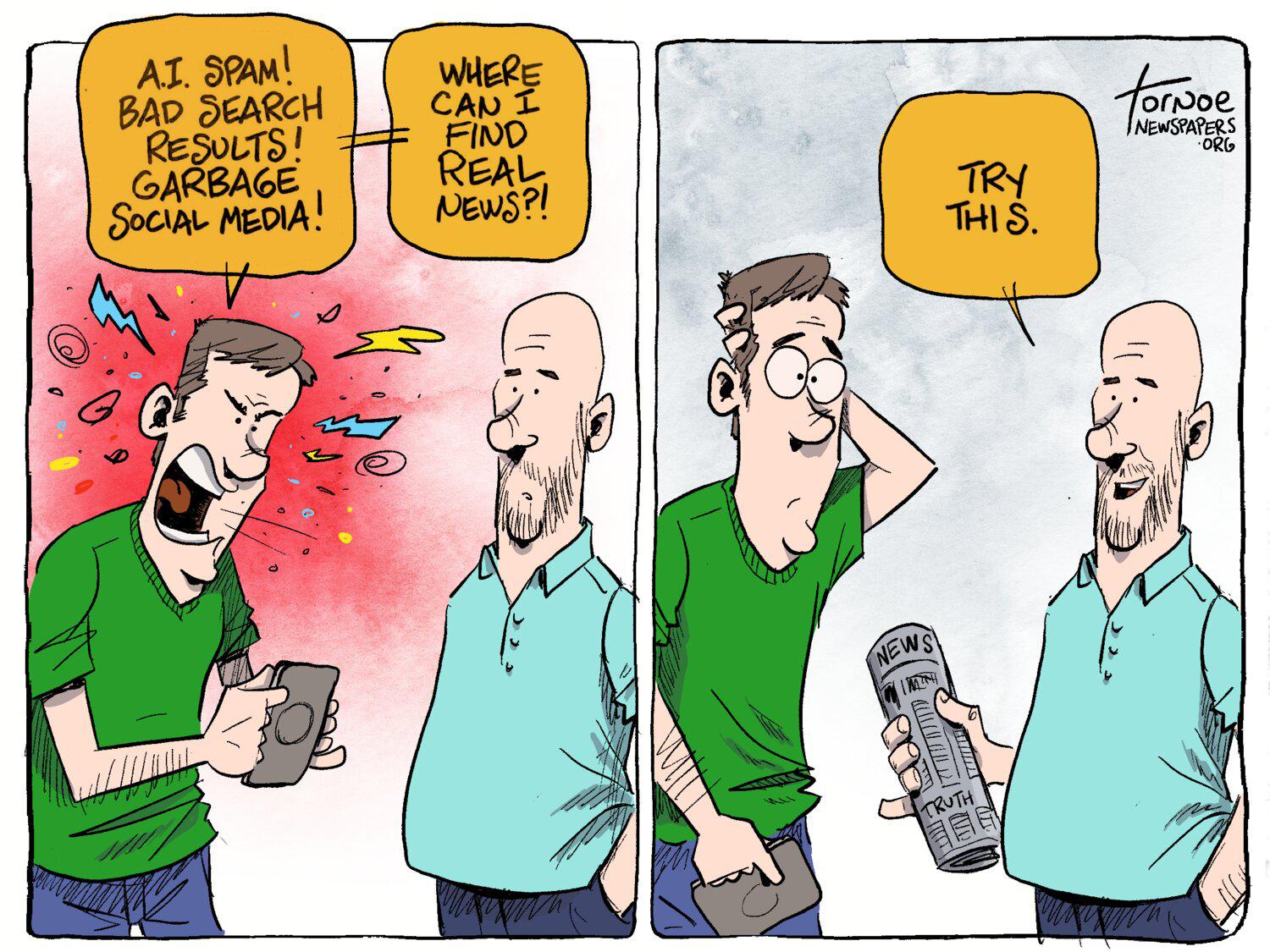Third Annual Press Freedom Gala Set for October 24
Guest Column:
Guest column: What Google’s monopoly ruling means for local newspapers
By Dean Ridings


Third Annual Press Freedom Gala Set for October 24
Guest Column:
Guest column: What Google’s monopoly ruling means for local newspapers
By Dean Ridings

Journalist Becca Martin-Brown retired last month after covering the arts scene in Northwest Arkansas for 35 years, including her final position as arts editor at the Northwest Arkansas DemocratGazette. She recently shared her memorable experiences and her views on art and newspapers with Arkansas Publisher Weekly
Would you share with our readers where you grew up, were educated and your career history?
I moved from Kansas to Arkansas to attend the University of Arkansas and to marry into a family whose roots went deep in the Arkansas Ozarks. The important skills of being a decent human being I learned from my in-laws, the late Wayne and June Martin of Pettigrew. The important skills of being a journalist I learned from Jim Morriss, a newspaper icon, after I started work as Lifestyles editor at The Springdale News in 1988. He taught me that journalism is a community service, something you provide with the commitment and regularity of a public utility without grandstanding or expectation of reward. You’ll inevitably fail — and you’ll inevitably make people mad — but if you’re fair and honest and compassionate, you’ll do okay!
What attracted you to writing and did that interest develop at a relatively young age? In the same vein, how did your interest in the arts emerge?
I didn’t intend to be a writer. I intended to be a character actress living in New York City, working on Broadway and eating at the automat I’d seen in Doris Day movies. I pictured myself as The Nurse in “Romeo and Juliet” or Jane Fonda’s repressed suburban mom in “Barefoot in the Park.” When I realized I was in no way that good, I took an opportunity to “apprentice” at my hometown newspaper while I was in junior college and discovered storytelling in print was even more rewarding — and you got paid!
What are some of the most memorable highlights of your arts coverage career?
I wish I had kept a list of the people I interviewed! I had lunch with Ted Neeley from “Jesus Christ Superstar” and cocktails with Jonathan Frid, who played Barnabas Collins on “Dark Shadows.” I got to chat with wrestler Mick Foley; Tim Conway; Lily Tomlin — I honestly can’t remember a lot of them!
However, the best part has always been being involved in the local arts scene — growing up with Arkansas Public Theatre in Rogers, which is doing professional-quality work as it starts its 39th season; being welcomed through the doors of TheatreSquared when it was brand new; getting to know the folks at Fort Smith Little Theatre, a true community theater in the best sense of the word for 75 years, and the Fort Smith Symphony, which turned 100 in 2023. And writing about the people who make this area unique — Trout Fishing in America; the Cate Brothers; artist Zeek Taylor; music promoter Brian Crowne... It’s those relationships that are the highlights over 35 years!

How has the “world of art” changed and developed in the region during your career? How would you evaluate the impact of Crystal Bridges on Northwest Arkansas and the entire state?
In 1992, I saw the Walton Arts Center go from a hole in the ground at the corner of Dickson Street and West Avenue to a regional Mecca for the arts, followed by Crystal Bridges Museum of American Art almost 20 years later. But I also know that before either one existed, University of Arkansas Theatre, Arts Center of the Ozarks, Rogers Little Theatre, the North Arkansas Symphony (now SoNA), the Shiloh Museum of Ozark History, the Rogers Historical Museum and so many more local institutions were laying the foundation for the “big kids” to build upon. Crystal Bridges and the Bentonville Film Festival have undeniably carried our previously well-kept secrets to bigger audiences, but once people arrive in Arkansas, they discover how deep and wide our arts root system runs.
What is the value of various forms of art in any society? Why are they important?
The traditional answer is that theater allows us to look at ourselves and our world and learn how to live better in it. And

Martin-Brown singing Seasons of Love with the cast of Rent at a rehearsal at Arkansas Public Theatre
that is certainly an eternal truth! But in my mind, the greatest value of any kind of art, whatever its form, is that it brings people together. An audience at a play or a concert or an art opening in NWA or the River Valley might include a Tyson, a Walton, a UA professor, an immigrant from the Marshall Islands, someone from China or India working at Walmart, a mountain biker visiting from California or Colorado ... the combinations of people are endless. And all of those people share that experience and take it away with them to impact their lives.
In an earlier retirement story you noted your adoption of a three-year-old special needs child. Could you comment on that experience and its effect on your life?
Nothing before or since can hold a candle to becoming the mother of “The Little Queen.” She was the topic of many, many columns in the newspaper — where she was called The Little Queen to protect her anonymity during the adoption process. I like to think her journey from an abused and starved toddler to a bright, happy, theater-loving young lady — although she remains profoundly disabled — helped change the world for those readers. She is the most important story I have ever told.
Can you comment on newspaper colleagues who had a special influence on your career? What about any artists with whom you developed close friendships?
So many! Jim Morriss, the longtime editor of The Springdale News; Dave Edmark, who was city editor when I started there and still keeps me on my toes via Facebook and email 35 years later; Lisa Thompson, the executive editor of the Northwest Arkansas Democrat-Gazette, who has been a great friend and mentor; Kyle Kellams of KUAF, who has been a partner in storytelling for who knows how many years...
And so many artists, too: Zeek Taylor, Mary Springer and John Rankine from Eureka Springs; Keith Grimwood and Ezra Idlet of Trout Fishing in America; Harry and Kathi Blundell, the heart that beat within the Arts Center of the Ozarks; Ed McClure, one of the founders of Arkansas Public Theatre... There just isn’t space to do justice to that list!
What work do you plan to continue now that you are retired?
I’m still writing as a freelancer for the Northwest Arkansas Democrat-Gazette. I have a new “Ozarks at Large” segment on KUAF with Kyle Kellams, using a present-day arts event as a hook to talk about the history of the area; and I’m working part-time at the Museum of Native American History, still telling stories, but now about 10,000 Indigenous artifacts that cross 24,000 years and two continents in a museum that exists because David Bogle, another NWA individual with a passion for the arts, turned his vision into reality.
What are your interests outside of work?
I see as much theater as I can with my daughter or my best friend; I play the piano and am learning the dulcimer and the ukulele; I create found-object and fiber art; I’m learning the intricacies of NFL football from my life partner, Gordon; I flea market with my sisters; and most important, I volunteer with the adults with disabilities at the Elizabeth Richardson Center group homes in Springdale.
The only thing I’d like to add is how important I think news gathered and provided by trusted sources in your community SHOULD be — whether it’s about the new housing development outside town or the latest city council decision or the opening of a new art exhibit. All of those things build what a community is.


A hard day’s work deserves a fair day’s pay, and every worker’s time has value. When most workers work more than 40 hours in a week, they get paid more, and, as of July 1, 2024, most salaried workers who earn less than $844 per week will become eligible for overtime pay under the final rule.
The U.S. Department of Labor final rule, Defining and Delimiting the Exemptions for Executive, Administrative, Professional, Outside Sales, and Computer Employees, took effect on July 1 and updates and revises the regulations issued under section 13(a)(1) of the Fair Labor Standards Act implementing the exemption from minimum wage and overtime pay requirements for executive, administrative, and professional (EAP) employees. Revisions include increases to the standard salary level and the highly compensated employee total annual compensation threshold, and a mechanism that provides for the timely and efficient updating of these earnings thresholds to reflect current earnings data.
However, some newspapers may be exempt from implementing this new rule, depending on circulation and coverage area.
“The small newspaper exemption exempts from overtime and federal minimum wage requirements ‘any employee employed in connection with the publication of any weekly, semiweekly, or daily newspaper with a circulation of less than four thousand[,] the major part of which circulation is within the county where published or counties contiguous thereto,’” said attorney Sarah Keith-Bolding of Quattlebaum, Grooms & Tull in Little Rock. “The DOL considers circulation to include all copies of the publication circulated or distributed by mail or otherwise, whether paid for or for free. This exemption does not have a salary basis requirement, so the increased threshold that went into effect on July 1 does not apply.”
There is also a corresponding exemption from Arkansas’s minimum wage, according to Keith-Bolding. Arkansas Code Ann. § 11-4-203(N) (exempting from the definition of “employee” “[a] n employee employed in connection with the publication of a

weekly, semiweekly, or daily newspaper with a circulation . . .[o]f less than four thousand (4,000); and . . . [t]he major part of which is within the county in which the newspaper is published or counties contiguous to the county in which the newspaper is published”).
Applying these exemptions can be complicated. For example, you may have to consider:
• Where there are two related newspapers, whether they must combine their circulation numbers for purposes of the exemption.
• Whether any particular employee is employed “in connection with the publication of” the paper.
• Whether an employee does non-exempt work for the employer or for a different but related company or entity.
“This is also an area of significant risk, since violations of minimum wage and overtime requirements are a common subject of lawsuits,” said Keith-Bolding. “In light of that, newspaper publishers should consider the previous summary for informational purposes only, not legal advice. Anyone who has questions about minimum wage or overtime exemptions and how to apply them would be well served by contacting a lawyer to guide them through an individual analysis.”
Read about wages and the Fair Labor Act at https://www.dol.gov/agencies/whd/flsa
Read the U.S. Department of Labor final rule at https://www.dol.gov/agencies/whd/overtime/rulemaking
Read the DOL Newspaper and Other Communications Exemptions at https://www.dol.gov/sites/dolgov/files/WHD/ legacy/files/FOH_Ch23.pdf
Read Fact Sheet #17H: Highly-Compensated Workers and the Part 541-Exemptions Under the FLSA at https://www.dol.gov/ agencies/whd/fact-sheets/17h-overtime-highly-compensated

Former Marion, Kansas chief of police Gideon Cody, who led the infamous raid on the Marion County Record and the home of its publisher a year ago, has been charged with felony obstruction of justice and is accused of persuading a potential witness to withhold information from authorities when they later investigated his conduct, according to an Associated Press report.
The charge against Cody alleges that he knowingly or intentionally influenced the witness to withhold information on the day of the raid on August 11, 2023, or sometime within the following six days. The charge was filed August 12, 2024, and is not more specific about Cody’s alleged conduct.
According to the Associated Press, a report from two special prosecutors earlier this month referenced text messages between Cody and a local business owner after the raid. The business owner has said that Cody asked her to delete text messages between
them, fearing people could get the wrong idea about their relationship, which she said was professional and platonic.
Prosecutors also said police search warrants signed by a judge contained inaccurate information because of “inadequate investigation” by the Marion County Police Department and were not legally justified.
The raid sparked a national debate about press freedom. Publisher Eric Meyer’s mother, who co-owned the newspaper and lived with him, died the next day of a heart attack, possibly due to the stress of the raid.
In an editorial last fall, Meyer wrote, “They came at us like a SWAT team going after a jaywalker who actually was in a crosswalk at the time. Now that the dust of seizing seven computers and four cell phones has settled, the truth has become clear. Their raid wasn’t to investigate any crime, which never occurred. It was to put us in our place, like a bunch of 300-pound defensive linemen smashing into a quarterback after
he releases a pass. Eventually, the legal system threw a flag on the play. But before that, people all over the globe—a quarter of a million of them who read about the raid on our website, plus countless others who read about it elsewhere—gasped in horror and demanded justice.”


The Scripps Howard Fund, in partnership with the Adam R. Scripps Foundation, will provide a four-year grant of up to $300,000 for the University of Memphis to create an open-source investigative program at its Institute for Public Service Reporting.
The Institute for Public Service Reporting is a nonprofit investigative newsroom on the university’s campus. The goal of the program is to help journalists with all levels of experience learn how to find, explore and report using publicly available information on the internet (open sources), social media, public databases, maps and videos. The program will include a master’s degree in journalism in open-source investigative reporting.
“We believe so strongly that open-source investigative reporting is vital to the future of journalism that we have decided to fund a second open-source program,” said Mike Canan, senior director of journalism strategies for the Scripps Howard Fund. “The Institute for Public Service Reporting will not only train and mentor the next generation of journalists, but it also will provide investigative journalism for a community that really needs it.”
The Institute, led by director and veteran investigative journalist Marc Perrusquia, will include:
• A one-week immersive open-source investigative boot camp that introduces the research methods that will be used throughout the year-long program. In addition to working journalists, the bootcamp is open to all college-level students, from rising freshmen to graduate students.
• A 12-hour core slate of courses that consists of open-source investigative reporting, social justice writing/reporting, data writing/reporting and advanced multimedia storytelling.
• A 12-week paid practicum at a Memphis-area print, digital or broadcast media outlet. Media partners in the practicum will include outlets in the Memphis area who have partnered with the Institute in the past.
“This grant positions the Institute for Public Service Reporting to expand our award-winning journalism and, just as critically, to sharpen our focus on our mission of mentoring the next generation of journalists,” said Perrusquia.
The program will offer two options for students: a graduate certificate in open-source investigative journalism, aimed primarily at working professionals who want to hone their skills; and a master’s degree of journalism in open-source investigative reporting, designed primarily for students who are seeking an advanced degree to further or advance their journalism careers.
The program will launch at the University of Memphis in the fall of 2025.


Not that many years ago, the best way you could find out about businesses in town would be through your local newspaper. Your local newspaper is still a great source of advertising information, but if you’re looking for something, chances are you’re going to start by “Googling it.” Have you ever wondered why that’s become our goto move? Well, a recent court ruling has shed some light on this, and it’s not a pretty picture.
Recently a federal judge ruled that Google has been running an illegal monopoly in the search engine market. Now, you might be thinking, “So what? Google’s just really good at what they do, right?” Well, it’s not quite that simple. The judge found that Google has been using tactics that squash competition and keep themselves at the top of the heap.
This is admittedly a complex issue, but this monopoly hasn’t just hurt other tech companies; it’s been slowly suffocating your local newspapers and, by extension, your communities.
How? Well, a few years ago if a local business wanted to advertise, they’d come to the local newspaper, the most effective place to promote a local business. That advertising revenue was used to pay journalists to cover your town hall meetings, high school sports and local events. Newspapers were the watchdogs, keeping an eye on your local government and celebrating your community’s achievements.
Enter Google. As they exerted their influence on the advertising market, those local advertising dollars started flowing to them instead of your hometown newspaper. The impact was significant and newspaper advertising revenue has continued to decline. The result? Fewer reporters on the street. Less coverage of your local issues. Some newspapers have even had to shut their doors completely. And since Google has no local reporters (they take the content from local newspapers and other sources), local news and information gets harder to find.
By Dean Ridings, CEO | America’s Newspapers
Google’s actions have had a very real impact on your community. When local news suffers, studies show that voter turnout drops, corruption goes unchecked and people feel less connected to their neighbors.
So, what’s next? This ruling is a good start. It’s a recognition that the playing field needs to be leveled. But it’s just the first step. There are legislative efforts underway aimed at giving news publishers a fighting chance. The Journalism Competition and Preservation Act (JCPA) is a bipartisan bill in Congress that would allow news publishers to collectively negotiate with tech giants like Google for fair compensation for our content. And another bill, the Community News and Small Business Support Act, would provide tax incentives to local newspapers based on the number of reporters they have covering the local market. With each of these bills it’s not about handouts; it’s about getting a fair shake for the value that newspapers bring to the table.
The next time you “Google” something, remember that convenience comes at a cost. And it’s a cost we’ve all been paying, often without even realizing it. It’s time to have a real conversation about how we can create a digital world that doesn’t just work for Big Tech, but for our local communities, too.
Whether it’s through antitrust actions, new legislation or a combination of both, we need to find a way to ensure that local journalism doesn’t just survive but thrives in the digital age. Because at the end of the day, a Google search might tell you where to find the closest pizza place, but it’s your local newspaper that’s going to tell you what’s really going on in your community. And that’s something worth fighting for. Our democracy depends on it.
Dean Ridings is CEO of America’s Newspapers, an advocacy group committed to explaining, defending and advancing the vital role of newspapers in democracy and civil life. Learn more at newspapers.org
